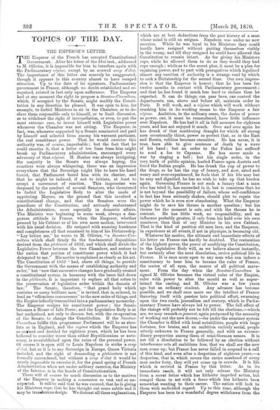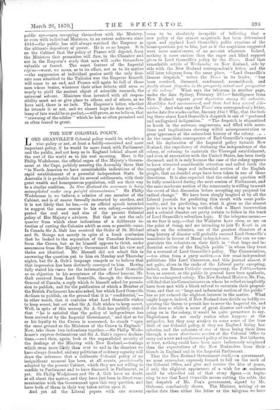TOPICS OF THE DAY.
THE EMPEROR'S LETTER.
THE Emperor of the French has accepted Constitutional Government. After his letter of the 21st inst., addressed to M. 011ivier, it is impossible for him to interfere again with the Parliamentary regime, except by an avowed coup de'tat. The importance of this letter can scarcely be exaggerated, though it appears in this country almost to have escaped attention. Up to the date of its signature, Parliamentary government in France, although no doubt established and re- cognized, existed in fact only upon sufferance. The Emperor had at any moment the right to propose a Senates-Consultum, which, if accepted by the Senate, might modify the Consti- tution in any direction he pleased. It was open to him, for example, to forbid Ministers to sit in the Chamber, or to de- clare them responsible only to himself, or to limit discussion, or to withdraw the right of interpellation, or even, to put the most extreme case, to invest himself with Legislative power whenever the Chamber was not sitting. The Emperor, in fact, was, whenever supported by a Senate nominated and paid by himself and selected from among his warmest partizans, the real constituent power. That he would exercise this authority was, of course, improbable ; but the fact that he could exercise it, that a letter of ten lines from him might break up Parliamentary administration, encouraged every adversary of that regime. M. Rouher was always intriguing, the majority in the Senate was always hoping, the courtiers were always whispering, there was an impression everywhere that the Sovereign might like to have his hand forced, that Parliament bored him with its chatter, and that he might be induced, if not to initiate, at least to accept a movement of reaction. This impression was deepened by the conduct of several Senators, who threatened to forbid the Legislative Body to alter the mode of appointing Mayors, on the ground that this involved a constitutional change, and that the Senators were the guardians of the Constitution, and seriously embarrassed the Administration, more especially in domestic affairs. The Ministry was beginning to seem weak, always a dan- gerous attitude in France, when the Emperor, whether pressed by his Cabinet or of his own mere motion, intervened with his usual decision. He resigned with amazing frankness and completeness all that remained to him of his Dictatorship. "Lay before me," he wrote to M. 011ivier, "a Senatus-Con- tultum which shall firmly fix the fundamental dispositions derived from the plebiscite of 1852, and which shall divide the Legislative Power between the two Chambers, and restore to the nation that portion of constituent power which it had delegated to me." His motive is explained as clearly as his act. The Constitution of 1852 "had, above all things, to provide the Government with the means of establishing authority and order," but "now that successive changes have gradually created a constitutional system in harmony with the bases laid down in the plebiscite, it is important to replace all that refers to the preservation of legislative order within the domain of law." The Senate, therefore, "that grand body which contains so many brilliant men," is invited, that is, ordered, to lend an "efficacious concurrence" to the new order of things, and the Empire is finally transmitted into a parliamentary monarchy. The Emperor resigns his constituent power ; the Senate becomes a House of Life Peers ; and the Legislative Body is at last authorized, not only to discuss, but, with the co-operation of the Senate, to change the Constitution. If the Senates- Consultum fulfils this programme Parliament will be as abso- lute as in England, and the regime which the Emperor has so sccined and derided for eighteen years, which he has been believed to consider worse than either Republicanism or auto- cracy, is re-established upon the ruins of the personal power. Of course it is open still to Louis Napoleon to strike a coup (Petal, but so it is to any Sovereign in Europe, Queen Victoria included, and the right of demanding a plebiscitum is not formally surrendered, but without a coup d'etat it would be nearly impossible to exercise it, for the grand spring of French Administration when not under military coercion, the Ministry of the Interior, is in the hands of Constitutionalists.
There will of course be much discussion as to the motives of the Emperor in making a concession so vast and so un- expected. It will be said that he was coerced, that he is giving his Ministers rope, that he has thought out some subtle and it may be treaeherous design. We distrust all these explanations, which are at best deductions from the past history of a man whose mind is still an enigma. Napoleon was under no new coercion. While he was loyal to his Ministers they could hardly have resigned without putting themselves visibly in the wrong, and till they resigned he could have allowed the. Constitution to remain intact. As for giving his Ministers rope, while he allowed them to do as they would they had_ rope enough ; while as to the secret plan, it must be a plan for regaining power, and to part with prerogatives which legalized almost any exertion of authority is a strange road by which to seek a Dictatorship for the second time. Our own impres- sion is that the Emperor is honest; that he has been for twelve months in contact with Parliamentary government ; and that he has found it much less hard to endure than he. expected. It can do things, can pass laws, can control the departments, can, above and before all, maintain order in Paris. It will work, and a re'ginte which will work without crushing him in its working seems to the Emperor a fair re'guree. Ambition, in the ordinary sense, the desire of power as power, can, it must be remembered, have little influence over Napoleon. He has had it all in full measure for eighteen. years, and has not enjoyed it much. Over and over again he- has drunk of that maddening draught for which all strong men occasionally thirst, power so perfect that, as in the East and Russia, volition becomes executive. He has never, it is- true, been able to give sentence of death by a wave' of his hand ; but an order to the Police has sufficed.
to send a foe to Cayenne. He has never made a. war by ringing a bell ; but his single order, in the very teeth of public opinion, hurled France upon Austria and. freed the Italian people. He has drunk the cup of power to the dregs, as he has the cup of luxury, and now, sated and weary and over-experienced, he feels that if his life may but be easy and dignified, he has no wish to take up that burden again. Governing France is not such a luxury that a man who has tried it, has succeeded in it, but is conscious that her is not beyond the possibility of failure, whose self-confidence. in fact has been seriously shaken, should plot to regain the power which he is even now abandoning. What the Emperor might do to save his throne is another question ; but his throne for the moment is safe, and with the throne he is.
content. He has little work, no responsibility, and art influence probably greater, if only from his hold over his own, nominees, than that of any Minister in his own Cabinet. That is the kind of position old men love, and the Emperor, in experience at all events, if not in physique, is becoming old.
Whatever his motive, the ultimate and immediate effects of his letter on France can hardly be doubted. The restoration. of the highest power, the power of modifying the Constitution,. to the Legislative Body will, as we believe almost instantly,. but certainly after the next dissolution, revive political life in France. It is once more open to any man who can induce a. constituency to hear him to become the ruler of France, the centre of all eyes, the source of all political move- ment. From the day when the Senatus-Consultum is. signed M. 011ivier becomes the virtual ruler of the Empire, ruler with power to alter the mould as well as super- intend the casting, and M. 011ivier was a few years. ago but an ordinary student. Any advance has become possible, and we shall once more see the intellect of France throwing itself with passion into political effort, swarming upon the two roads, journalism and oratory, which in Parlia- mentary France have always led to power. The full effect of the change will probably not be felt till the elections,—which are, we may remark enpassant, again postponed by the necessity of working out the new decree,—for under the nominee system the Chamber is filled with local notabilities, people with large fortunes, few brains, and an ambition entirely social, people utterly unknown to France generally, and with an extraor- dinary proportion among them of semi-German names. It is. not till a dissolution to be followed by an election without interference sets all ambitions free, that we shall see the new men come up; but France has never failed to respond to a call of this kind, and even after a despotism of eighteen years,—a. despotism, that is, which covers the entire manhood of every man under forty, they will yet come up in crowds. It is life which is revived in France by this letter. As to its immediate result, it will not only release the Ministry from a secret fetter which has hitherto impeded action, but compel them to act with a force which has hitherto been somewhat wanting to their career. The nation will look to them with undivided regard. Up to this time, although the Emperor has been to a wonderful degree withdrawn from the
public eye—men occupying themselves with the Ministry, or even with individual Ministers, to an extent unknown since 1848—the public has still always watched the Emperor as the ultimate depositary of power. He is so no longer. It is on the Cabinet that the policy of France will depend, from the Ministers that promotion will flow, in the Chamber and not in the Emperor's study that men will make themselves valuable or feared. The worst feature of the Imperial rigieze—worst, we mean, as to its effect, not as to its motive —the suppression of individual genius until the only first- rate man admitted to the Tuileries was the Emperor himself, will come to an end, and France will again be full of those men whose brains, whatever their other defects, still seem so nearly to yield the ancient object of scientific research, the universal solvent. Ministers thus invested with all respon- sibility must act or give place to others, and of others, as we have said, there is no lack. The Emperor's letter, whether he intends it or not, and we almost hope he does not,—the irony of fate would be so perfect,—will prove, as we believe, that " crowning of the edifice" which he has so often promised and so often feared to grant.



































 Previous page
Previous page